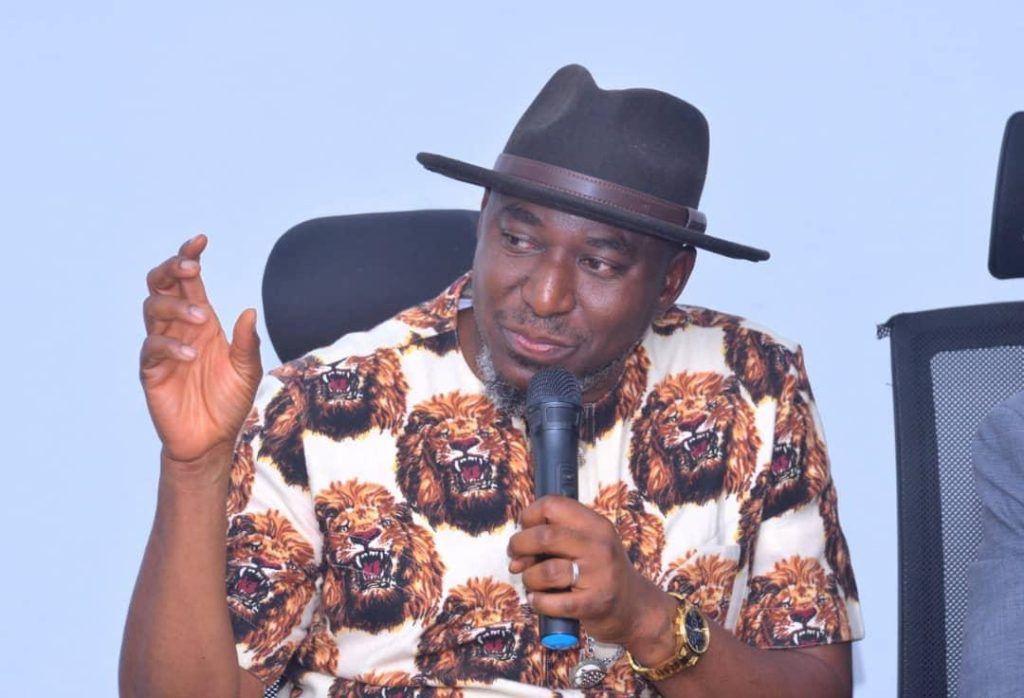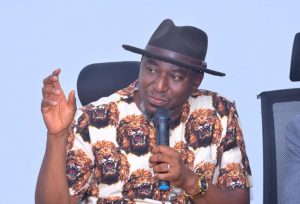
Engr. Ikechukwu Monday, Commissioner for Power and Public Utilities
Abia jettisons old electricity law, presents fresh bill


From Boniface Okoro, Umuahia

A new electricity bill being sponsored by Abia State government has scaled through Second Reading in the State’s House of Assembly, the Commissioner for Information, Prince Okey Kanu, has disclosed.
Kanu told journalists at a post-State Executive Council Media Briefing on Monday at Government House that the new bill was all-encompassing and would give Abia the leverage to regulate the electricity.
Recall that the 7th Abia State House of Assembly, on December 13, 2022, passed into law, the Abia State Electric Power Authority and Power Station Law. Unfortunately that piece of legislation could be termed as an effort in futility because neither former Governor Okezie Ikpeazu nor the sitting Governor, Dr Alex Otti, signed the bill into law. With the state presenting a fresh electricity bill, it appears that the previous law has been jettisoned.
“The passage of the Abia State Electricity Bill will give further impetus to the ongoing reforms in the power sector in the state,” the Commissioner said, expressing hope that the state legislators would fast-track the passage of the bill when they resume from their current recess.
Offering more explanations, the Commissioner for Power and Public Utilities, Engr. Ikechukwu Monday, said the government has been working on the bill for quite a while.
He explained that passage of the bill into law would give the state government the opportunity to own power assets and also regulate the sector.
“The Electricity Bill will give the state the authority to establish its own electricity agency, meaning that they are able to generate, transmit and distribute. And not just that, they regulate the market.
So, we have been working on this law. I think five states have already established their own electricity regulatory agencies.
The contents of this law, at the end when it is passed, it will give us the mandate to establish Abia State Electricity Regulatory Authority, it will also give us the mandate to establish Abia State Rural Electrification Agency and also we have three electricity funds. These funds will take care of infrastructure, subsidy, when needed, to pass liquidity to the electricity market.
He said the bill “also considered other sources of energy like renewable energy, even including hydrogen sources, for future ways of generating energy. So, it is an all-encompassing law.”
He added that the law would help investors to get their returns on investments and also protect consumers. “We have sections that actually take care of metering, take care of tariff. So, this now gives any player the ability to perform efficiently and give reliable electricity supply to our people,” he said.
The Commissioner noted that the law would be “a good thing for Geometric because now, they have a localized regulatory body within the state,” adding that “the law is a law that is specifically designed for Abia State.
“Every state have their own issues with electricity and in Abia State, we are very fortunate that we have gas supply and our dream is that Abia state can be the hub of generating electricity power supply to the Southeastern part of Nigeria,” he said, disclosing that the Public Hearing, the next stage of the law making process, would come up soon.
According to him, the Dr. Alex Otti-led administration was discussing with stakeholders to harness the resource for electricity supply and also to industries since Abia is blessed with gas in abundance, with a lot of the gas fields within the state that were still capped.
Speaking on the Abia State Electric Power Authority and Power Station Law, Monday said it was not discarded but that government extracted useful aspects and incorporated same into the current, brand new, bill
“We looked at that law, I am not sure it was properly gazetted. There are inputs from there that we took into consideration in this new bill. That law was passed when the Electricity Act of 2023 has not been enacted. That Act now gives us the mandate to now put in this bill.
“So, what is in that (previous Abia State Electric Power Authority and Power Station) law is not enough to take care of the Abia State electricity market. We did not discard the information there. In fact, we took some parts from there as well. This (Abia State Electricity Bill) is a brand new law,” he explained.
After exiting office as the member representing Umunneochi State Constituency, Hon. Okey Igwe, who sponsored the Abia State Electric Power Authority and Power Station Law, had appealed to Governor Otti to sign the bill into law.
“All said, HAB-12 was finally passed into law towards the end of the 7th House. It is a law today waiting for a visionary governor to assent and unlock its potentials. Few days ago, President Bola Tinubu assented to an electricity bill seeking to repeal the Electricity and Power Sector Act of 2005.
“That bill is now the electricity Act. It essentially, de-monopolizes generation, transmission, and distribution of electricity at the National level. It empowers states, companies and individuals to generate, transmit, and distribute electricity intrastate and within the outer limits allowed by the constitution.
“This exactly is what HAB-12 was designed and passed into law to achieve for Abia State. It is a game changer. I hereby call on Governor Otti to assent to this bill and unleash innovation in the energy space in Abia. This will ultimately jump-start our Industrial Revolution” he stated.
The Law’s object clause indicates that’s it seeks to: “ensure that areas within the state not covered by a National Grid system would have access to electricity to improve the lives of citizens in the hinterland; act as an economic stimulus by enhancing industrialization and development of small and medium scale enterprises in the hinterland; and increase job opportunities for the gainful employment of some citizens.”
In an article on various media platforms, Hon. Igwe posited that “HAB12 will unleash electric power boom in Abia State that is capable of igniting an industrial revolution the likes of which this country has never seen before. Unlike the national grid system, HAB12 will free investors to compete and by so doing foster efficiency while lowering price for consumers. Our teeming youths will find gainful employment and social vices will greatly diminish.
“Finally, let me end this way. The difference between the western hemisphere and Sub-Saharan Africa is simply a deficit of infrastructure especially electric power for the simple reason that electricity is necessary for just about every 21st century human activity. Let us replicate the telecoms boom in power and win for Abia.”



